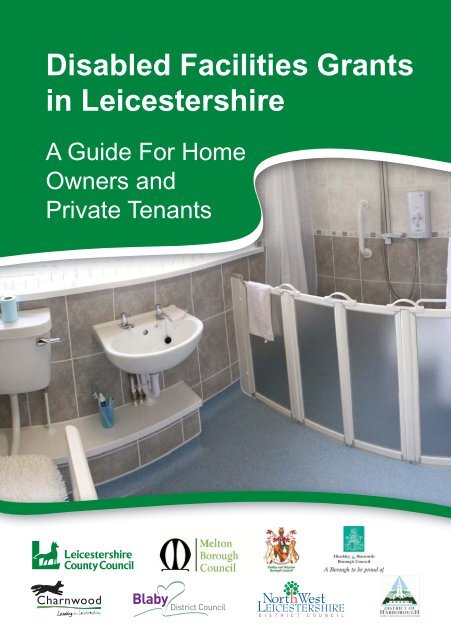Disabled Facilities Grants in Leicestershire a Guide for Home ...
Disabled Facilities Grants in Leicestershire a Guide for Home ...
Disabled Facilities Grants in Leicestershire a Guide for Home ...
You also want an ePaper? Increase the reach of your titles
YUMPU automatically turns print PDFs into web optimized ePapers that Google loves.
<strong>Disabled</strong> <strong>Facilities</strong> <strong>Grants</strong><br />
<strong>in</strong> <strong>Leicestershire</strong><br />
A <strong>Guide</strong> For <strong>Home</strong><br />
Owners and<br />
Private Tenants
Introduction<br />
<strong>Disabled</strong> <strong>Facilities</strong> <strong>Grants</strong> (DFG’s) were <strong>in</strong>troduced <strong>in</strong> 1989<br />
and are provided <strong>in</strong> <strong>Leicestershire</strong> by the local Councils.<br />
They provide fi nancial help <strong>for</strong> disabled people who need<br />
an adaptation to their home. This <strong>in</strong>cludes people who own<br />
their own home, tenants, and people liv<strong>in</strong>g <strong>in</strong> houseboats and<br />
caravans.<br />
Examples of works the grant might cover:<br />
• a stairlift<br />
• ramped access <strong>in</strong>to a home<br />
• replac<strong>in</strong>g a bath with a level access shower<br />
<strong>Leicestershire</strong> County Council’s Social Care Services (called<br />
Social Care from now on) have responsibility <strong>for</strong> assess<strong>in</strong>g<br />
people’s needs and arrang<strong>in</strong>g community care services. If<br />
Social Care assesses a disabled person as need<strong>in</strong>g major<br />
adaptations to their home <strong>in</strong> order to allow them to live as<br />
<strong>in</strong>dependently as possible, they will make recommendations<br />
<strong>for</strong> a DFG to the relevant Council.<br />
This booklet gives you guidance on:-<br />
• What work can be carried out under a DFG<br />
• Who you need to contact if you wish to apply <strong>for</strong> a DFG<br />
• Who pays <strong>for</strong> the DFG<br />
• How long it may take<br />
• What the stages of the DFG process are<br />
• The conditions of the grant<br />
1
There is a checklist on page 11 which can be used to record<br />
progress on the adaptation.<br />
Also <strong>in</strong>cluded <strong>in</strong> this booklet are details of the grant process on<br />
page 7 and our service standards on page 8.<br />
1. What work can be done under a DFG?<br />
If you, or someone <strong>in</strong> your household is disabled then the grant<br />
is mandatory <strong>for</strong> adaptations that Social Care class as essential<br />
to give you better freedom of movement <strong>in</strong>to and around<br />
your home and to access essential facilities with<strong>in</strong> it. Where<br />
necessary it can also provide the essential facilities themselves.<br />
In some circumstances other work may be carried out but this<br />
would be the decision of the Council concerned.<br />
The Council will only offer mandatory grants if the scheme<br />
proposed is reasonable and practical; schemes that are not,<br />
will be turned down by the Council. The types of work are listed<br />
below:<br />
2<br />
• to make it easier to get <strong>in</strong>to and out of the dwell<strong>in</strong>g by, <strong>for</strong><br />
example, widen<strong>in</strong>g doors and <strong>in</strong>stall<strong>in</strong>g ramps;<br />
• ensur<strong>in</strong>g the safety of the disabled person and other occupants<br />
by, <strong>for</strong> example, provid<strong>in</strong>g a specially adapted room <strong>in</strong> which<br />
it would be safe to leave a disabled person unattended or<br />
improved light<strong>in</strong>g to ensure better visibility;<br />
• to make access easier to the liv<strong>in</strong>g room;<br />
• by provid<strong>in</strong>g or improv<strong>in</strong>g access to the bedroom, kitchen,<br />
toilet, wash bas<strong>in</strong> and bath<strong>in</strong>g facilities; <strong>for</strong> example, by<br />
<strong>in</strong>stall<strong>in</strong>g a stairlift or <strong>in</strong>stall<strong>in</strong>g a level access shower;
• to improve or provide a heat<strong>in</strong>g system <strong>in</strong> your home which is<br />
suitable to the needs of the disabled person;<br />
• to adapt heat<strong>in</strong>g or light<strong>in</strong>g controls to make them easier to<br />
use;<br />
• to improve access and movement around the home;<br />
• to enable the disabled person to care <strong>for</strong> another person who<br />
lives <strong>in</strong> the property, such as a spouse, child or another person<br />
<strong>for</strong> whom the disabled person cares; and<br />
• to improve access to and from the garden of your home where<br />
feasible.<br />
Some local Councils offer discretionary grants <strong>for</strong> work which<br />
is not listed above or to provide fi nancial assistance to help you<br />
move to a more suitable property if it is not feasible or practical<br />
to adapt your exist<strong>in</strong>g home. You are advised to contact your<br />
local Council directly <strong>for</strong> further <strong>in</strong><strong>for</strong>mation on the availability<br />
of discretionary grants.<br />
2. Who do you need to contact to apply <strong>for</strong> a<br />
grant?<br />
There are seven local Councils <strong>in</strong> <strong>Leicestershire</strong> who<br />
provide <strong>Disabled</strong> <strong>Facilities</strong> <strong>Grants</strong>, these are:<br />
• Blaby District Council<br />
• Charnwood Borough Council<br />
• H<strong>in</strong>ckley and Bosworth Borough Council<br />
• Harborough District Council<br />
• Melton Borough Council<br />
3
• North West <strong>Leicestershire</strong> District Council<br />
• Oadby and Wigston Borough Council<br />
In the first <strong>in</strong>stance you should contact <strong>Leicestershire</strong> County<br />
Council, be<strong>for</strong>e you apply <strong>for</strong> a grant on:<br />
Leicester (0116) 305 0004<br />
They employ Occupational Therapists who are qualifi ed to give<br />
you advice on how best to overcome your diffi culties. They will<br />
need to visit you <strong>in</strong> your home and may, if necessary, ask to<br />
speak to your doctor. hospital and so on, depend<strong>in</strong>g on your<br />
circumstances.<br />
A DFG must be applied <strong>for</strong> by an owner or private tenant of the<br />
property. This person (the grant applicant) may or may not be<br />
the disabled occupant <strong>for</strong> whom the work is <strong>in</strong>tended.<br />
Some Councils use <strong>Home</strong> Improvement Agencies to adm<strong>in</strong>ister<br />
some or all DFG cases on their behalf.<br />
3. Who Pays?<br />
a) What will I have to pay?<br />
Mandatory DFG’s are means tested. This means that the grant<br />
applicant may be required to pay an amount towards the costs<br />
of adapt<strong>in</strong>g their home. If the disabled person is eligible <strong>for</strong><br />
and receiv<strong>in</strong>g certa<strong>in</strong> means tested benefi ts then they will not<br />
be required to pay towards the work. If the disabled person is<br />
a child, there is no means test and no contribution to pay.<br />
4
To work out what you would be expected to pay, the Council<br />
carries out a means test that is set by law. They compare your<br />
weekly <strong>in</strong>come with standard weekly liv<strong>in</strong>g costs. Any capital<br />
and assets you have are considered as <strong>in</strong>vestments that could<br />
generate weekly <strong>in</strong>come. However your fi rst £6,000 of sav<strong>in</strong>gs<br />
are ignored.<br />
Any <strong>in</strong>come that you have over the Government’s standard<br />
liv<strong>in</strong>g costs (<strong>for</strong> someone <strong>in</strong> your circumstances) is considered<br />
as money available to pay off a ten year loan. Your contribution<br />
is, there<strong>for</strong>e, an amount equivalent to a loan which you could<br />
af<strong>for</strong>d to pay off over a ten year period.<br />
Your contribution can vary from a few pounds to the whole cost<br />
of the adaptation. If the test reveals your contribution is higher<br />
than the cost of the adaptations needed you may still wish to<br />
apply <strong>for</strong> a ‘nil’ grant (even though you won’t get any money)<br />
because your costs will be taken <strong>in</strong>to account should you need<br />
more alterations to your property with<strong>in</strong> the next 10 years. Also<br />
by go<strong>in</strong>g through the ‘nil grant’ route you get the expertise and<br />
support of your Occupational Therapist and the Grant Offi cer.<br />
As the means test is set by law your Council is not able to vary,<br />
change or ignore the result.<br />
b) What will my Council pay?<br />
The grant is the difference between what the grant applicant is<br />
assessed as be<strong>in</strong>g able to af<strong>for</strong>d, and the reasonable cost of<br />
the adaptation. There is, however, a maximum limit of £30,000<br />
<strong>for</strong> mandatory grants. Any grant payable over this amount is at<br />
the discretion of the <strong>in</strong>dividual Council.<br />
5
c) What if I can’t af<strong>for</strong>d my contribution?<br />
If you are unable to raise your contribution you should contact<br />
your Occupational Therapist <strong>for</strong> advice.<br />
4. How long will it take?<br />
The <strong>Leicestershire</strong> authorities have a target of complet<strong>in</strong>g 70%<br />
of major adaptations with<strong>in</strong> 12 months and all stairlifts with<strong>in</strong> 6<br />
months. As a County we are look<strong>in</strong>g to reduce the time taken<br />
to process grant applications. Your local Council will be able<br />
to provide <strong>in</strong>dividual average times and per<strong>for</strong>mance <strong>for</strong> your<br />
area and you are advised to contact your local Council directly<br />
<strong>for</strong> more <strong>in</strong><strong>for</strong>mation.<br />
5. The stages of the <strong>Disabled</strong> <strong>Facilities</strong> Grant<br />
process<br />
The procedures detailed <strong>in</strong> this leafl et have been agreed<br />
between Social Care and the local Councils.<br />
The procedure of apply<strong>in</strong>g <strong>for</strong> a grant varies depend<strong>in</strong>g on<br />
whether you will be apply<strong>in</strong>g <strong>for</strong> a grant <strong>for</strong> major build<strong>in</strong>g works<br />
or <strong>for</strong> the <strong>in</strong>stallation of equipment such as stairlifts and through<br />
fl oor lifts.<br />
On page 7 there is a fl owchart to show the stages of a usual<br />
‘major’ adaptation <strong>for</strong> example a level access shower.<br />
6
<strong>Disabled</strong> <strong>Facilities</strong> Grant Process –<br />
Major adaptations (eg. Bathrooms)<br />
OT makes a recommendation <strong>for</strong> major adaptations<br />
<strong>Disabled</strong> <strong>Facilities</strong> Grant enquiry sent to<br />
relevant local Council<br />
Means Test<br />
Jo<strong>in</strong>t visit - Occupational Therapist / Council or Agent/<br />
Architect if required<br />
Sketch scheme if required, agreed with OT / Council /<br />
Service User<br />
Production of fi nal plans<br />
Schedule of works<br />
Plans and schedule approved by all parties<br />
Grant application pack out / fi nal <strong>in</strong><strong>for</strong>mation collated /<br />
Costs obta<strong>in</strong>ed from builders<br />
Grant approval / work arranged / started<br />
Check visits and care plan amendments<br />
7
Customer Service Standards<br />
Topic When you: We will: In the<br />
follow<strong>in</strong>g<br />
timescale<br />
Hous<strong>in</strong>g<br />
Adaptations<br />
(Major)<br />
Have been<br />
assessed by<br />
Social Care<br />
that you need<br />
a major<br />
adaptation<br />
and they have<br />
carried out a<br />
referral to us<br />
Assist you<br />
with a grant<br />
application<br />
through to<br />
completion of<br />
the works<br />
70% of cases<br />
with<strong>in</strong> 12<br />
months of the<br />
Social Care<br />
referral<br />
Hous<strong>in</strong>g<br />
Adaptations<br />
(Stair Lifts)<br />
Have been<br />
assessed by<br />
Social Care<br />
that you need<br />
a stair lift and<br />
they have<br />
carried out a<br />
referral to us<br />
Assist you<br />
with a grant<br />
application<br />
through to<br />
completion of<br />
the works.<br />
70% of cases<br />
with<strong>in</strong> 6<br />
months of the<br />
Social Care<br />
referral<br />
6. Conditions of the grant<br />
You will be given the grant conditions at the time you receive your<br />
grant approval documentation, you should read these carefully.<br />
Please note:<br />
• You will already have signed a certifi cate (at application stage)<br />
stat<strong>in</strong>g that it is your <strong>in</strong>tention to rema<strong>in</strong> <strong>in</strong> the property <strong>for</strong> the<br />
next fi ve years. If it becomes apparent that this is not your<br />
<strong>in</strong>tention the Council may recover any grant monies paid.<br />
8
• Some Councils will require repayment of a DFG over £5,000<br />
if the property is sold (or other similar circumstances).<br />
You will be advised whether this will apply to you.<br />
• If it appears that after the grant is approved you are not entitled<br />
to it, the Council may withhold or reclaim grant monies.<br />
7. General<br />
You may be asked to arrange <strong>for</strong> draw<strong>in</strong>gs of your home.<br />
You can choose whoever you want <strong>for</strong> this but you must take<br />
responsibility <strong>for</strong> the cost of the plans. Although architects fees<br />
can be <strong>in</strong>cluded and paid out of the DFG, if you do not proceed<br />
with the grant works (<strong>for</strong> any reason) you are expected to pay<br />
these fees. These fees can only be paid if and when the grant<br />
is approved and the works proceed.<br />
Once your grant is approved you should contact your builder<br />
to arrange <strong>for</strong> the works to start. The builder must not start<br />
the works until you have received your approval document.<br />
You have 12 months from approval to complete the work.<br />
If your local Council uses a <strong>Home</strong> Improvement Agency to<br />
adm<strong>in</strong>ister the grant, these works will be arranged <strong>for</strong> you on your<br />
behalf. However please be aware that if <strong>for</strong> any reason you do<br />
not proceed with your grant application, you will be required to<br />
pay <strong>for</strong> any costs such as architect fees <strong>in</strong>curred by the Agency.<br />
Please note that, other than specialist equipment <strong>for</strong> example<br />
lifts, you are responsible <strong>for</strong> any repairs <strong>in</strong> connection with your<br />
grant work (if you have specialist equipment repairs are only<br />
covered if you have agreed to ‘sign the equipment over’ to the<br />
County Council).<br />
9
Record of contacts:<br />
Name<br />
Contact details:<br />
Your<br />
Occupational<br />
Therapist is:<br />
Your Grant<br />
Offi cer is:<br />
Your Builder<br />
is:<br />
Other (eg.<br />
Architect)<br />
10<br />
Notes:<br />
........................................................................................................<br />
........................................................................................................<br />
........................................................................................................<br />
........................................................................................................<br />
........................................................................................................<br />
........................................................................................................
Progress on your adaptation:<br />
Stage<br />
Date<br />
Your fi rst enquiry<br />
Your Social Care assessment<br />
First visit by Grant Offi cer<br />
First visit by an Architect<br />
Sketch plan fi rst seen<br />
Plan agreed and signed by yourself<br />
Application pack received<br />
Builders visit to price <strong>for</strong> the works<br />
Application submitted to the Council<br />
Grant approved by the Council<br />
Start date<br />
Completion date<br />
Grant Offi cer fi nal visit<br />
Social Care f<strong>in</strong>al visit<br />
11
This <strong>in</strong><strong>for</strong>mation can be made available on request, <strong>in</strong> other<br />
languages and <strong>for</strong>mats (Large Pr<strong>in</strong>t, Braille or on Audio tape)<br />
by contact<strong>in</strong>g:<br />
<strong>Leicestershire</strong> County Council<br />
Adaptations Team<br />
Leicester (0116) 305 9229<br />
oA m‚Aihèw‚I b‚IÈ B‚AS‚AoAem‚A& on‚e êp‚m‚A& (m‚AetA ox‚rAem‚A&, o&F‚il‚èip‚èm‚A& oW‚v‚A oAeidèoAe<br />
teqp‚) zp‚r n‚Ic‚e mujb‚ s‚&p‚kƒ krI iv‚èn‚&w‚I krv‚AW‚I m‚LI X‚ke Ce:<br />
l‚estrX‚Ay‚r kAzntI kAz<strong>in</strong>s‚èl‚<br />
oedepteX‚ns‚ tIm‚<br />
0116 305 9229<br />
éh jAMkArI hor BASAv@ áwe ¢p@ ivÝÚc (v&de CApe, bòel j@ ÁidÝQ tep we) á&ge ilÝKe<br />
ánusAr s^prk krke benwI krn we õpªbF kIwI jA skfI hE:<br />
lEstrsAér kAõ¼tI kO¼sl<br />
ÅdEpteSn tIm<br />
°±±¸ ³°μ »²²»<br />
12<br />
MAY 2011
















